
James McClean: Derry's Creggan gave me everything to succeed
A street party will be held where he grew up to honour the Irish international on winning 100 caps.
2023-06-24 13:26
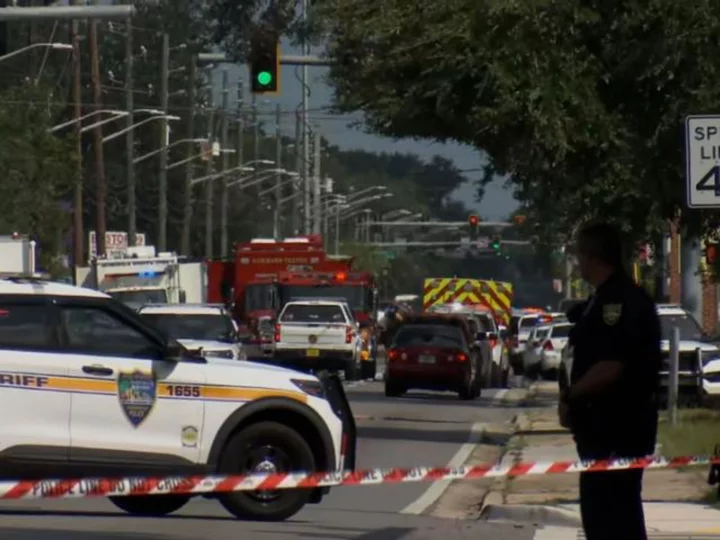
Jacksonville gunman was turned away from historically Black university before racist shooting that killed 3 at nearby store, authorities say
The gunman who killed three people at a Dollar General store in Jacksonville, Florida, on Saturday had earlier been turned away from the campus of a historically Black university -- just blocks away from the site of the shooting that targeted Black people, authorities said.
2023-08-27 13:50

840,000 Afghans who've applied for key US resettlement program still in Afghanistan, report says
More than 840,000 Afghans and their families who applied for a resettlement program aimed at people who helped the U.S. war effort in Afghanistan are still there waiting
2023-09-02 05:59

'Not fully accurate': Bre Tiesi opens up about anxiety over 'Selling Sunset' dramatizing her personal life
'It's just one of those things where people have to take it with a grain of salt and understand that there's a difference', said Bre Tiesi
2023-05-19 05:51

Trump won't try to move Georgia case to federal court after judge rejected similar bid by Meadows
Lawyers for former President Donald Trump say he will not seek to get his Georgia election interference case transferred to federal court
2023-09-29 06:46
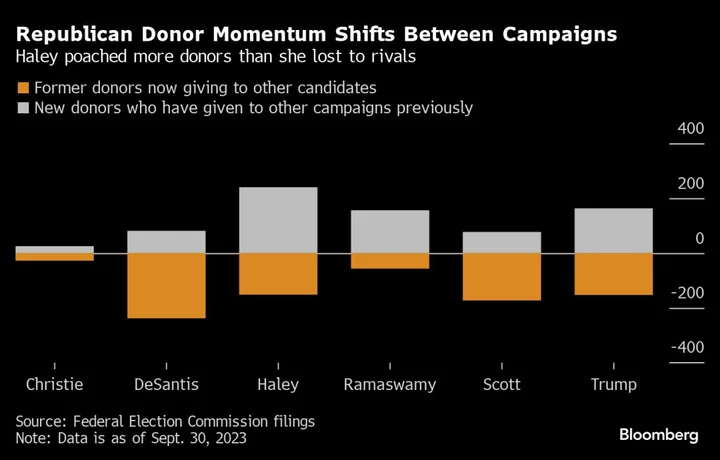
Nikki Haley Poaches Donors From Republican Rivals
Former United Nations Ambassador Nikki Haley is poaching donors from her Republican competitors, fueling a surge in her
2023-11-14 00:55

Students told ‘avoid all robots’ after Oregon University bomb threat prank
Students at the Oregon State University were warned to “avoid all robots” following a bomb threat prank involving automated food delivery machines on campus. The threat was made by a student on Tuesday via social media, causing university staff to issue the urgent warning. “Bomb Threat in Starship food delivery robots. Do not open robots. Avoid all robots until further notice. Public Safety is responding,” the institute wrote on X, formerly known as Twitter. The university later provided several updates on the unfolding situation, saying that the robots had been isolated in a “safe location” before being inspected by a technician. Students were advised to “remain vigilant for suspicious activity”. The emergency was declared over just before 2pm local time with “normal activities” resuming. “All robots have been inspected and cleared. They will be back in service by 4pm today,” the university later wrote online. Starship, the company that designs the robots, said that despite the student’s subsequent admission that the bomb threat had been “a joke”, it had suspended the service while investigations were ongoing. In its own statement, the company wrote: “A student at Oregon State University sent a bomb threat, via social media, that involved Starship’s robots on the campus. “While the student has subsequently stated this is a joke and a prank, Starship suspended the service. “Safety is of the utmost importance to Starship and we are cooperating with law enforcement and the university during this investigation.” Read More University of Michigan slithers toward history with massive acquisition of jarred snake specimens Trump boasts that he ‘killed’ Tom Emmer’s speaker bid ‘Bandaid on an open chest wound’: Democrats mock latest speaker chaos
2023-10-25 09:18
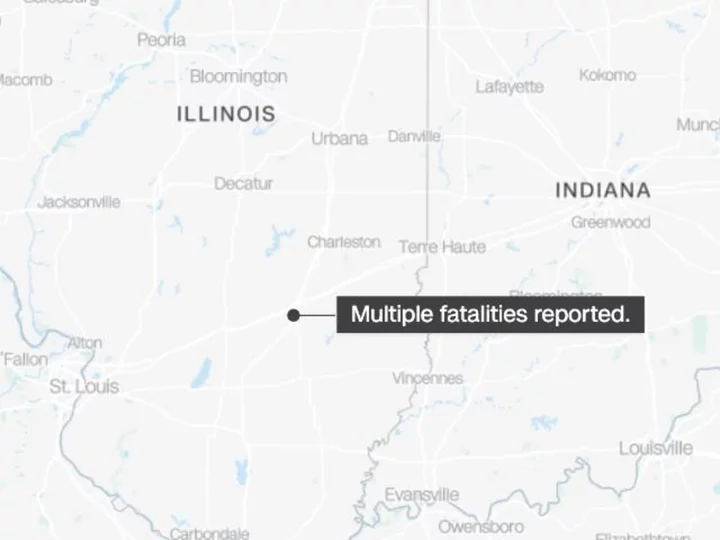
Multiple fatalities, evacuation order in place after semi carrying ammonia crashes in Illinois
Multiple fatalities have been confirmed following a crash involving a semi-truck that leaked anhydrous ammonia in Effingham County, Illinois, authorities say.
2023-09-30 20:54

Biden making $20 billion available from 'green bank' for clean energy projects
The Biden administration is making available $20 billion from a federal “green bank” for clean energy projects such as residential heat pumps, electric vehicle charging stations and community cooling centers
2023-07-14 17:55
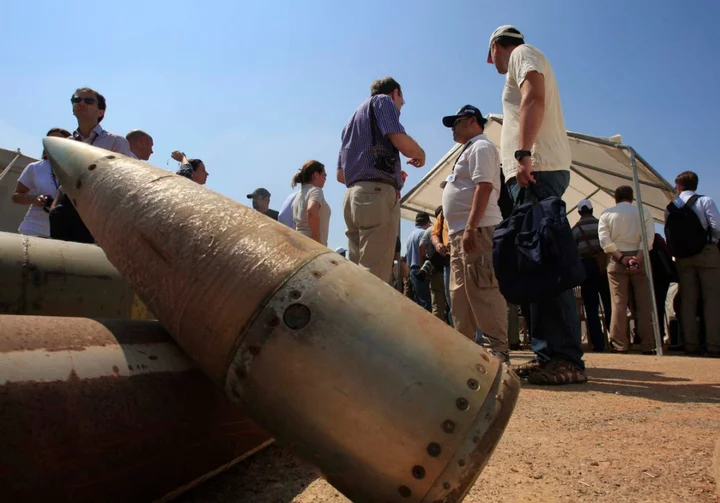
What are cluster munitions? The controversial weapons US will send to Ukraine
The United States has announced that it is sending cluster munitions to Ukraine to help its military push back Russian forces entrenched along the front lines. The administration of Joe Biden said that it will send thousands of them as part of a new military aid package worth $800m (£630m). The move will likely trigger outrage from some allies and humanitarian groups that have long opposed the use of cluster bombs. Proponents argue that both Russia and Ukraine have already been using the controversial weapon in Ukraine and that the munitions the US will provide have a reduced dud rate, meaning there will be far fewer unexploded rounds that can result in unintended civilian deaths. Ukraine has welcomed the decision, saying it needs “weapons, more weapons, and more weapons, including cluster munitions” if it is to defeat Russia. Mykhailo Podolyak, a senior adviser to the Ukrainian president, Volodymyr Zelensky, said the outcome of the war started by Moscow’s invasion depended on the volume of arms Kyiv receives. “In the great bloody war which has been ongoing for more than 16 months, and which will predetermine the future of the world … the number of weapons matters. So, weapons, more weapons, and more weapons, including cluster munitions,” he said on Friday. Here is a look at what cluster munitions are, why they are so controversial and where they have been used. What is a cluster munition? A cluster munition is a bomb that opens in the air and releases smaller “bomblets” across a wide area. The bomblets are designed to take out tanks and equipment, as well as troops, hitting multiple targets at the same time. The munitions are launched by the same artillery weapons that Western allies have already provided to Ukraine for the war — such as howitzers — and the type of cluster munition that the US is sending is based on a common 155 mm shell that is already widely in use across the battlefield. Why are they so controversial? In previous conflicts, cluster munitions have had a high dud rate, which meant that thousands of the smaller unexploded bomblets remained behind and killed and maimed people decades later. The US last used its cluster munitions in battle in Iraq in 2003, and decided not to continue using them as the conflict shifted to more urban environments with more dense civilian populations. On Thursday, Brigadier General Pat Ryder – the Pentagon press secretary – said the US Defense Department has “multiple variants” of the munitions and “the ones that we are considering providing would not include older variants with [unexploding] rates that are higher than 2.35 per cent”. A convention banning the use of cluster bombs has been joined by more than 120 countries, which agreed not to use, produce, transfer, or stockpile the weapons and to clear them after they've been used. The US, Russia and Ukraine haven't signed on. Why provide them now? For more than a year the US has dipped into its own stocks of traditional 155 howitzer munitions and sent more than two million rounds to Ukraine. Allies across the globe, including the UK, have provided hundreds of thousands more. A 155 mm round can strike targets 15 to 20 miles (24 to 32 kilometres) away, making them a munition of choice for Ukrainian ground troops trying to hit enemy targets from a distance. Ukrainian forces are burning through thousands of rounds a day battling the Russians. Yehor Cherniev, a member of the Ukrainian parliament, told reporters at a German Marshall Fund event in the US this spring that Kyiv would likely need to fire 7,000 to 9,000 rounds daily during the intensified counteroffensive. Providing that many puts substantial pressure on US and allied stocks. The cluster bomb can destroy more targets with fewer rounds, and since the US hasn’t used them in conflict since Iraq, it has large amounts of them in storage it can access quickly, said Ryan Brobst, a research analyst for the Foundation for Defense of Democracies. A March 2023 letter from top House and Senate Republicans to the Biden administration said the US may have as many as three million cluster munitions available for use, and urged the White House to send the munitions to alleviate pressure on American war supplies. “Cluster munitions are more effective than unitary artillery shells because they inflict damage over a wider area,” Mr Brobst said. “This is important for Ukraine as they try to clear heavily fortified Russian positions.” Tapping into the US stores of cluster munitions could address Ukraine’s shell shortage and alleviate pressure on the 155 mm stockpiles in the US and elsewhere, Mr Brobst said. Is using cluster bombs a war crime? The use of cluster bombs itself does not violate international law, but using them against civilians can be a violation. As in any strike, determining a war crime requires looking at whether the target was legitimate and if precautions were taken to avoid civilian casualties. “The part of international law where this starts playing [a role], though, is indiscriminate attacks targeting civilians,” Human Rights Watch’s associate arms director Mark Hiznay said. “So that's not necessarily related to the weapons, but the way the weapons are used.” Where have cluster bombs been used? The bombs have been deployed in many recent conflicts. The US initially considered cluster bombs an integral part of its arsenal during the invasion of Afghanistan that began in 2001, according to Human Rights Watch (HRW). The group estimated that the US-led coalition dropped more than 1,500 cluster bombs in Afghanistan during the first three years of the conflict. The Defense Department had been due to stop use of any cluster munitions with a rate of unexploded ordnance greater than 1 per cent, by 2019. But the Trump administration rolled back that policy, allowing commanders to approve the use of such munitions. Syrian government troops have often used cluster munitions — supplied by Russia — against opposition strongholds during that country’s civil war, frequently hitting civilian targets and infrastructure. And Israel used them in civilian areas in south Lebanon, including during the 1982 invasion. During the month-long 2006 war with Hezbollah, HRW and the United Nations accused Israel of firing as many as four million cluster munitions into Lebanon. That left unexploded ordnance that threatens Lebanese civilians to this day. The Saudi-led coalition in Yemen has been criticized for its use of cluster bombs in the war with the Iran-backed Houthi rebels that has ravaged the southern Arabian country. In 2017, Yemen was the second deadliest country for cluster munitions after Syria, according to the UN. Children have been killed or maimed long after the munitions originally fell, making it difficult to know the true toll. In the 1980s, the Russians made heavy use of cluster bombs during their 10-year invasion of Afghanistan. As a result of decades of war, the Afghan countryside remains one of the most heavily mined areas in the world. What has the White House said? The United States will provide Ukraine with cluster-style artillery rounds for use on their own territory to repel Russian invading forces, the White House has said. National Security Adviser Jake Sullivan told reporters on Friday that Kyiv has “provided written assurances” that it would use the controversial weapons “in a very careful way that is aimed at minimising any risk to civilians”. He said the Defence Department would provide further details on the next arms package that will be sent to Ukraine, but he pointed out that Kyiv’s forces are “firing thousands of rounds a day to defend against Russian efforts to advance and also to support its own efforts to retake its sovereign territory”. The national security adviser suggested the decision to provide Ukraine with cluster weapons already in US stocks was necessary to keep up a steady flow of arms for Kyiv’s defence. “We have provided Ukraine with a historic amount of unitary artillery rounds and we are ramping up domestic production of these rounds. We’ve already seen substantial increases in production, but this process will continue to take time, and it will be critical to provide Ukraine with a bridge of supplies. While our domestic production is ramped up,” he said. “We will not leave Ukraine defenceless at any point in this conflict period.” Mr Sullivan noted that Russia has been using their own version of cluster munitions, which are antipersonnel weapons that make use of small “bomblets” to maximise their effectiveness against massed troops, and pointed out that the Russian weapons have a high rate of failure which leaves the battlefield littered with unexploded ordinance. He added that the US-made shells that will be provisioned to Kyiv’s defence forces have a much lower failure rate, and said Ukraine’s government has committed to post-war de-mining that would prevent civilians from being harmed by unexploded submunitions, which in past conflict zones have lingered for years. While a 2008 treaty, the Oslo Convention on Cluster Munitions, has been signed by more than 100 nations which have agreed to ban the use of such weapons, neither the US, Russia, nor Ukraine are signatories to the treaty. What has the Pentagon said? Speaking at a Defence Department briefing on Friday, Undersecretary of Defence for Policy Colin Kohl said the next US arms package to Ukraine would include the Dual-Purpose Improved Conventional Munition, which is used both for anti-armour and anti-personnel purposes. “With this announcement, we will be able to provide Ukraine with hundreds of thousands of additional artillery ammunition immediately. This decision will ensure we can sustain our support for Ukraine by bringing us to a point where we are producing sufficient artillery ammunition on a monthly basis across the coalition,” he said. Both Mr Kahl and Mr Sullivan also contrasted Russia’s use of the weapons on Ukraine’s territory with Ukraine’s desire to use them to defend their own land. “When we look at what Ukraine would be doing with these weapons, as opposed to what Russia is doing with these weapons, we see a substantial difference. It doesn’t make it an easy decision, and I’m not going to stand up here and say it is easy,” Mr Sullivan said, adding that the US had deferred a decision on providing cluster munitions for quite some time because it “required a real hard look at the potential harm to civilians”. “When we put all of that together, there was a unanimous recommendation from the national security team, and President Biden ultimately decided — in consultation with allies and partners and in consultation with members of Congress — to move forward on this step,” he said. Mr Kahl admitted that the US has criticised Russia’s use of cluster munitions because they have been doing so indiscriminately, and with older, less reliable systems that cause more civilian casualties. But he said Kyiv has assured the US that they will not use the DPICMs rounds in civilian areas or urban environments, and they have also committed to recording where they are used to aid in cleanup efforts post-war. The Associated Press contributed to this report Read More Ukraine-Russia war – live: US to send cluster bombs to Kyiv for first time Biden to ‘compare notes’ with Sunak on Ukrainian fightback The ‘chip wars’ between the US and China will have far-reaching technological and military repercussions The Body in the Woods | An Independent TV Original Documentary The harrowing discovery at centre of The Independent’s new documentary
2023-07-08 04:45

Biden, Herzog discuss Israel tensions at White House
Joe Biden and his Israeli counterpart Isaac Herzog on Tuesday discussed tensions over a controversial judicial shake-up inside Israel that the US president has branded...
2023-07-19 06:53

xQc: Why did police show up unannounced at streamer’s Texas house again?
xQc was visibly outraged as police showed up at his Texas house again while he was in the middle of a broadcast
2023-06-09 13:26
You Might Like...

Facebook content moderators in Kenya call the work 'torture.' Their lawsuit may ripple worldwide

Trump suffers loss in second E Jean Carroll defamation case

Texas man urges Supreme Court to stay out of major Second Amendment case

Why did Paige Spiranac hit out at Jay Monahan amid PGA Tour-LIV Golf merger? 'You can wear shorts now'

Arnold Schwarzenegger, 76, sheds light on aging and body image struggles as he promotes his self-help book

Utah mom who gave YouTube parenting advice arrested on suspicion of child abuse, police say

Mother sparks debate after ‘shaming’ parent who wouldn’t give her daughter a slice of birthday cake
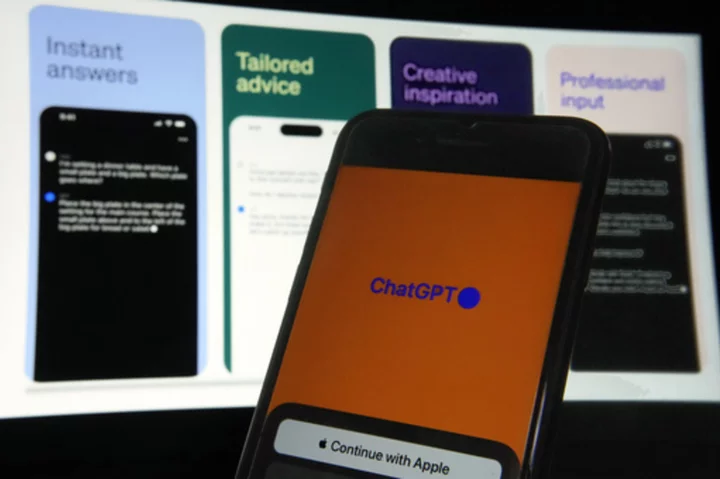
ChatGPT makes its debut as a smartphone app on iPhones
